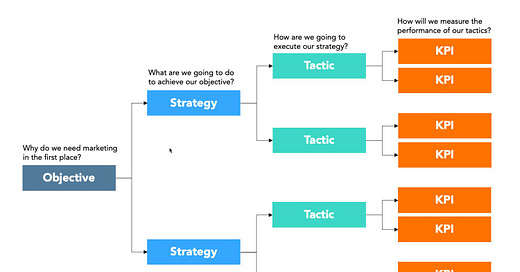Issue № 83 | London, Sunday 21 May 2023
📸 First, flashback to the beginning of the year when I told you that Elon Musk has never spent a dime on advertising. This week, he said he’ll ‘try a little advertising’.
👉🏻 Now, read on to learn why:
① Ideally, a CMO would be given one KPI: profit growth.
② You should tell your marketing team what they need to achieve, not how.
③ Growth continues to elude post-Brexit Britain.
④ What makes CBDCs better than the money we have today is programmability.
⑤ Advertisers are expected to return to Twitter.
⑥ Social capital can be earned, invested and spent, just like any other currency.
⑦ Income inequality threatens the future of the world’s most famous tech hub.
What's new
If you’re not following consultant Tom Goodwin on LinkedIn, you should be. He has a fresh, thought-provoking take on most things and this week he really struck a chord with me on the topic of what key performance indicators to measure.
① In short:
“The approach in the image [above] is entirely wrong. People at the most, should be given the highest order KPIs possible for the role, and the fewest. They should never be proxies for things that matter, but what actually matters. Ideally a CMO would be targeted by one KPI, profit growth. That's all companies really care about. And the person would have total freedom to accomplish that how they see fit.”
“Since they may not have control over the costs, or sales teams, it's more likely they'd be given KPIs on: brand awareness, price elasticity, value sales growth, customer lifetime value, market share. Add more than this and you're not measuring success, you're telling someone how to do the job.”
“As the industry has become lost, as trust in marketers has decreased, we're seeing KPIs being build from tactics up. We're seeing people measure utterly meaningless tiny things, and spent time in the pointless chasing of numbers for defensibility of action, not what we know to be best for our company.
Hitting these KPIs becomes the job.”
Why it matters
Management guru Peter Drucker famously told us that “[only] what gets measured, gets managed.” What he forgot to warn us about was that as soon as you start measuring something, it can all too easily become your sole focus.
As Tom says in his post, give them the wrong KPIs and your marketing team will soon be spending their days figuring out how to get people to spend longer on websites, how to increase open rates of newsletters, how to increase futile NPS scores, how to decrease CTR rates for ads, despite the fact many of these don’t contribute to what really matters: increasing your profits.
We should be setting long term goals and measuring metrics that may, therefore, be slow to change, hard to measure, and difficult to attribute.
What to do about it
Take action
When setting your marketing team’s KPIs, disregard what is fast, cheap or easy to measure and identify instead the metric(s) that matter. They should relate to your objectives, not your tactics.
As Tom says, ideally - and at its most simplistic - marketers should be set a KPI related to profit growth. But there will also be times when your objectives are more specific - such as transitioning from a wholesale to a retail model, for example. If so, it makes sense to measure your marketing not merely on profit but also where it comes from.
② I urge you to to spend 20 minutes on Monday reviewing your marketing team’s KPIs. Are you measuring their progress towards your strategic objectives or the results of their tactics? The former means they’re focused on serving your business, the latter means you're telling them how to do their jobs; and you’re likely wrong. Your marketing team should be told what their need to achieve; leave the how to them.
Get help
Visit InMarketing, my resource library for leaders in finance or technology who want to innovate, interact and influence.
Join the InMarketing community, either on Twitter or on Substack (you’ll need to download the Substack app and head to the chat tab). Either way, you can ask questions of me and fellow senior marketing practitioners.
Help me
If you found this useful or know someone who would, please share it. Every time you do, it helps me to grow the community of regular IMTW readers.
Top stories
The other articles that are worthy of your time.
FINANCE
City of London grandees lay out vision for UK markets
③ Growth continues to elude post-Brexit Britain.

“After a bruising few months in which the capital has been rocked by a slew of firms heading towards New York, the Capital Markets Industry Taskforce, headed by London Stock Exchange chief Julia Hoggett, announced it had commissioned a new deep dive on UK capital markets in a bid to carve out a new narrative for Britain as an international financial centre.”
“L&G chief Sir Nigel Wilson will help author the new report alongside Freshfields lawyer and capital markets guru Mark Austin, Penny James, a senior independent director at Hargreaves Lansdown and former CEO of Direct Line Group, and Alex Hickman, a former business special advisor to the Prime Minister.”
“The report, set to be published in Autumn this year, will look to lay out a ‘comprehensive, concise, and easily understandable report’ that sets out the ‘new market model needed to help deliver growth across the broader UK economy’.”
TECHNOLOGY
Central-bank digital currencies are talked about more than coming to fruition
④ What makes CBDCs better than the money we have today is programmability.

“Declining cash usage, the rise of cryptocurrencies and Facebook’s possible launch of a digital currency called Libra all pushed central banks to look for ways to avoid losing control of their financial systems. Fully 114 countries, representing over 95% of world GDP, have now launched or are exploring CBDCs, up from only 35 in mid-2020.”
“The impact of CBDCs will depend greatly on their design. […] The fully launched CBDCs and pilots have converged on a few common principles. They are typically intermediated by commercial banks and work with private wallet-providers, limiting the complexity of managing them. […] They have caps on how much users can hold. […] None bear interest and all have zero transaction fees, at least for now. The reason for usage caps and zero interest is to avert large outflows of deposits from commercial banks into CBDCs.”
“What might make CBDCs special: Lewis Sun, who heads emerging payments for HSBC, a bank, thinks that although using CBDCs for payments alone may not be that different from existing wholesale payment systems, ‘Programmable money is unique.’ Rich Turrin, a Shanghai-based author of the book ‘Cashless’ about China’s CBDC, describes an experiment in the province of Chengdu, where reports suggest six farmers were given e-CNY with smart contracts stipulating that it could be used only for farming purposes. Some think this could be a step towards a dream of fine-grained more efficient control over the entire economy. CBDCs could also help countries perform the messaging and movement of funds required for cross-border transactions, possibly bypassing the dollar system, suggests Mr Turrin.”
MEDIA & MARKETING
Twitter no longer ‘high risk’ after new chief hired, says top ad group
⑤ Advertisers are expected to return to Twitter as Musk implicitly admits the subscriber model won’t work after all.

“WPP-owned GroupM, one of the world’s top media agencies, has told clients it no longer considers Twitter “high risk”, just days after Elon Musk appointed advertising stalwart Linda Yaccarino as the social media platform’s new chief.”
“The move marked a push to woo back dozens of major advertisers who deserted the platform over Musk’s unorthodox leadership style and looser content moderation following his $44bn acquisition. The exodus wiped about 50 per cent off Twitter’s $5bn-a-year revenues.”
“Industry insiders predict Yaccarino will be able to repair relations, noting her reputation for strong relationships as a Madison Avenue veteran.”
WILDCARD
Building social capital when you work remotely
⑥ Social capital can be earned, invested and spent, just like any other currency.
“While social capital has always been integral to collaboration at work, it is essential for every hybrid and remote employee and for solo entrepreneurs.”
“Since this work has rendered many of these employees less visible, it has become non-negotiable for these employees to invest in their own interpersonal relationships.”
“The author suggests five strategies for these employees to grow their social capital intentionally:
Be gracious with your time,
Communicate strategically and with intention,
Track your efforts,
Stay on top of your inbox, and
Be generous and practice gratitude.”
Off cuts
The stories that almost made this week’s newsletter.
FINANCE
😲 Revolut in shareholder battle with SoftBank as UK licence talks stall
😮 Revolut UK chief told customer he would be waiting for him with a shotgun
🪑 How a publicity-shy chair is revamping Deutsche Bank
🪜 Morgan Stanley chief James Gorman to step down within a year
🤷🏼♀️ What women employees say about Goldman Sachs’ culture
TECHNOLOGY
🤑 Crypto ‘resembles gambling’, Treasury committee warns government
⛓️ The potential of blockchain technology in revolutionising payment systems
🫨 How fintech can adapt to a tougher environment
🇮🇹 Crédit Agricole in tokenized SME bond trials with Bank of Italy
👋 Klarna UK boss quits but predicts BNPL firm will “trailblaze”
MEDIA & MARKETING
🐦 Meta’s rumored Twitter competitor could launch as early as next month
🚢 If this is Instagram’s Twitter competitor, I’m ready to jump ship
🎬 Twitter now allows paid users to upload two-hour long videos
The last word
⑦ Merlin, who has spent the past 35 years homeless in San Francisco, on drug use in Market Street and the decay of the City by the Bay:
“Five years ago, a black guy with a pipe got arrested; now the police walk past a white guy with a needle in his arm.”
Don’t settle for marketing.
Strive for InMarketing: innovate, interact, influence.
Wishing you a productive week,
P.S. I recommend you watch Ben Affleck’s Air which I saw last night. A great film in its own right, it’s particularly interesting to marketers. Product, passion, persuasion, purpose, promotion, profit, positioning - it’s all there. Just do it.









